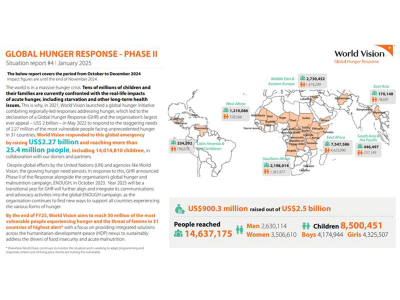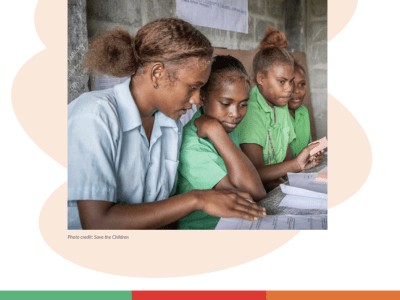article / February 4, 2025
Will Hope Find a Way through Lebanon’s Crises?
In Lebanon, children face multiple crises, including disrupted education and displacement. World Vision Lebanon, funded by Hong Kong, supports Lebanese residents and Syrian refugees in Mhammara through psychosocial support, vocational training, and cash assistance. This project aims to improve mental health, social interactions, and livelihoods for families and children affected by ongoing crises.
publication / January 31, 2025
Lebanon Response Sitrep #11
The agreement on the cessation of hostilities has been extended until February 18. However, in the last week, at least 30 civilian casualties have been recorded. Access to over 70 villages in southern Lebanon remains restricted, preventing people from returning home and posing security risks for displaced populations attempting to rebuild their lives. Humanitarian actors continue to face significant access constraints, making it difficult to provide essential aid to affected communities. While the agreement continues to prevent a return to full-scale conflict, localised violence, military operations and security risks persist.
The humanitarian response remains strained, with significant funding gaps limiting aid distribution, infrastructure repairs and healthcare services. Food insecurity continues to rise, with 1.65 million people facing crisis-level food shortages and 201,000 in emergency conditions (IPC Phase 4). The destruction of agricultural land, market disruptions and logistical challenges are further deepening Lebanon’s economic crisis, affecting both displaced and host communities.
Despite the challenges, humanitarian actors are scaling up response efforts, repairing homes and shelters, providing warm clothes and heat, and restoring essential services. However, with only 58% of the 2024 Flash Appeal met, a sharp increase in funding is needed to meet growing humanitarian demands. Sustained diplomatic efforts and international support will be essential in preventing further deterioration and ensuring a comprehensive path toward recovery and peace in Lebanon.
publication / January 31, 2025
Global Hunger Response - Phase II Quarterly Situation Report - January 2025
First 2025 GHR quarterly report details qualitative and quantitative impacts, regional overviews, and highlights from Phase II (Oct-Dec 2024).
publication / January 10, 2025
Middle East Crisis (MEC) Response |LEBANON SITREP #10
Lebanon is grappling with a severe humanitarian crisis following 14 months of escalating violence. Over 4,000 people have been killed, including 290 children and 790 women, while nearly 1.2 million people have been displaced. Despite a 60-day cessation of hostilities, fragile security conditions prevent over 160,900 people from returning home. Many remain in temporary shelters, facing destroyed infrastructure and limited access to basic services. Nearly 100,000 homes have been fully or severely damaged, rendering thousands homeless and exacerbating vulnerabilities among at-risk populations.
article / January 20, 2025
A Teacher’s Resilience: Isa’s Mission to Provide Refugee Children with Learning Amidst Sudan Crisis
The ongoing crisis in Sudan has had a significant impact on many women and children. Families have been forced to leave their homes in search of safety in neighbouring countries, such as South Sudan. Numerous schools have been destroyed, leaving both students and teachers displaced.
article / February 4, 2025
World Vision empowers Ukrainian refugees in Moldova through livelihood initiatives
Svitlana*, a Ukrainian refugee in Moldova, overcomes hardship through World Vision’s livelihood programmes, transforming her life and supporting her family.
publication / December 30, 2024
Make it 18 Report: Community Voices on Child Marriage Reform in Solomon Islands
Make it 18 Report: Community Voices on Child Marriage Reform in Solomon Islands
article / January 17, 2025
AI in education - empowering learning with human expertise
AI in education - empowering learning with human expertise at World Vision
publication / December 6, 2024
Middle East Crisis (MEC) Response |LEBANON SITREP #8
After over two months of intense conflict and nearly a year of escalating hostilities, a ceasefire came into effect on 27 November at 04:00 local time, marking a pivotal moment for Lebanon. The agreement is rooted in implementing UN Resolution 1701 (2006), establishing a 60-day timeline for withdrawing forces from southern Lebanon and deploying Lebanese Armed Forces (LAF) along the border.
In the hours preceding the ceasefire, 26 November witnessed devastating airstrikes by the country to the south of Lebanon, causing significant destruction across multiple areas. Beirut was heavily impacted, particularly its central district and southern suburbs, leading to widespread panic. The Bekaa Valley suffered similar devastation, while Saida and the Rashidieh Palestinian refugee camp were targeted for the first time since October. Additionally, airstrikes severed the Aridah crossing between northern Lebanon and Syria, further isolating the country.
Since the ceasefire, many displaced families have begun returning to their communities. However, these returns are fraught with challenges, as many encounter destroyed homes, damaged infrastructure, and limited access to basic services. Others remain unable to return due to safety concerns and access restrictions, particularly in southern Lebanon.






